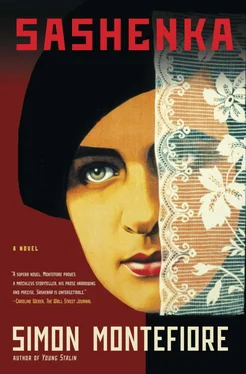“In the end, we’ll put them all up against the wall,” said Mendel. “Now, listen to me. You might never hear from Sagan again. But if he turns up, talk to him, draw him out. He could be helpful to the Party and to me.”
“What if he tries to recruit me?”
“He will. Let him think that’s possible.”
“What if a comrade sees me with him?” she said anxiously.
“The Inner Bureau of the Committee will be informed of this operation. Three of us—a troika—just me and two others. Are you afraid?”
Sashenka shook her head. Her eyes were almost glowing in the dark. He could see she was scared and excited to have such a mission. “But I could be killed by my own comrades as a traitor?”
“We’re both in danger every minute,” he replied. “The very second you become a Bolshevik, your normal life is over. You walk forever on burning coals. It’s like leaping onto a sleigh galloping so fast you can never get off. Chop wood and chips fly. We’re in a secret war, the Superlative Game, you and I. The Party against the Okhrana. You do as I tell you, nothing more, and you report every word to me. You know the codes and the drops? Be vigilant. Vigilance is a Bolshevik virtue. You’ve become an asset to the Party quicker than I could have predicted. Understand?”
Mendel took care to moderate his voice and hoped he sounded convincing. He offered his hand and they shook. Her hand felt as silky, delicate and nervy as a little bird whose bones could be crushed with ease. “Good night, comrade.”
Sashenka stood up and pulled on her coat, stole, boots and shapka and wrapped her head in the scarf. At the door she turned back, pale and serious.
“I’d hate you to protect me because I was family.”
“I never would, comrade.”
“See the filly over there?” said the old coachman in the sheepskin, his cheeks as red as rare beef.
“Her again. Is she nursing a broken heart?”
“Is she a working girl or planning a bank robbery?”
“Perhaps she’s booked a room at the hotel?”
“Is she slumming it for a lover who knows how to clean a horse’s arse? Me, for example!”
“Hey, girl, have a vodka on us!”
In the middle of St. Isaac’s Square, not far from Greater Maritime Street, somewhere between the Mariinsky Palace and the cathedral, stood a flimsy wooden hut, painted black, with a tarpaulin roof so it looked like a giant one-horse cab with the hood up. Here in the bleary realm of overboiled cabbage and winter sweat, the coachmen of the one-horse cabs—the izvoshtikis —came to drink and eat in the early hours in a world beyond exhaustion.
Sashenka, a rough karakul coat and leather cap beside her, sat on her own and put some kopeks into the noisy automatic barrel organ. It started to play “Yankee Doodle” and then some Strauss waltzes and presently “Yankee Doodle” again. Lighting a cigarette, she stared through the window at the Rolls-Royces outside the Astoria Hotel, the falling snow, and the horses tapping their hooves on the ice outside, waiting patiently, their breaths and whinnies all visible in the cold.
Two days had passed since her meeting with Mendel. At eleven that night, Lala had looked in on her in her bedroom.
“Turn your lights out now, darling,” she said. “You look tired.” Lala sat on her bed and kissed her forehead as always. “You’ll hurt your eyes with all that reading. What are you reading about?”
“Oh Lala…one day I’ll tell you,” Sashenka said, curling up to sleep, anxious that her governess should not discover that under the bedclothes she was dressed ready to go out.
Once she knew Lala was asleep, she crept outside, taking a streetcar and then an izvoshtik over to the factories on the Petrograd Side. She spent an hour at the workers’ circle at the Putilov and, together with another young intellectual, a boy from the Gymnasium, and a couple of lathe turners, they delivered the spare parts for a printing press to a new hideout in Vyborg.
Afterward she had an hour to kill so she walked along the Embankment and then along the Moika over her favorite little bridge, the Bridge of Kisses, past the ocher Yusupov Palace that more than any other building represented the iniquitous wealth of the few. She came here to the coachmen’s hut because it was close to home—and yet in another dimension.
She ordered spicy ukha fish soup, goat’s cheese, black Borodinsky bread and some tea—and sat listening to the men’s gossip. When they talked about her as a dish, a looker, she did not quite understand what they meant. She could see her reflection in the little window and felt dissatisfied as always. She preferred to picture herself out in the freeze, buried in her high-necked coat, stole and shapka .
Cut out the vanity, Sashenka told herself. Her looks did not interest her. Like her uncle Mendel, she lived for the Revolution. Wherever she looked in the streets, she saw only those who would benefit from the beautiful march of the dialectic.
She dipped the bread and cheese into some mustard, and spluttered as the burn raced up her nose into her sinuses. Afterward, she nibbled at a shapeless sugar lump and reflected that she was happier now than she had ever been in her entire life.
As a child, her parents had taken her to Turbin to visit the rabbinical court of her grandfather, Abram Barmakid, the saintly rabbi, with his beadles, disciples, students and hangers-on. She was very young and her father was not yet such a swell, and they lived in Warsaw, which was full of Hasidic Jews. But nothing had prepared Sashenka for the medieval realm of Abram Barmakid. The honest fanaticism, the rigid joy, even the guttural Yiddish language, the men with ringlets, fringed shawls and gabardine coats, the bewigged women—all of it scared her. Even then, she had feared their medieval spells and superstitions.
Yet she now reflected that her grandparents’ world of golems and evil eyes was no worse than the secular money worship of her father’s marketplace. Since childhood, she had been shocked by the injustices she had seen at Zemblishino and the manor house on his vast estates on the Dnieper. The luxury and debauchery of her parents’ wretched marriage seemed to her to epitomize the rottenness of Russia and the capitalist world.
Mendel had rescued her from all this wickedness, and had changed her life. If you love then love with verve; if you threaten mean it well , the poet Alexei Tolstoy had written. That was her: “ All or nothing! ” She reveled in the delicious, almost amorous feeling of being part of a secret, a giant conspiracy. There was something seductive about sacrificing the old morality of the middle classes for the new morality of the Revolution. It was like sitting in this café: the very unromance of it was what made it so romantic.
She glanced at her watch: 4:45 a.m. Time to go. She pulled on the coat and hat again, tossed down some coins. The coachmen watched, nodding at her. On the street, the draymen were delivering the milk crates, the patisserie van loading up with freshly baked bread. Carters dragged in sacks of coal. Janitors cleaned the steps. Piter was awakening.
The freezing air was so refreshing after the musk of the little hut that she inhaled it until it burned her lungs. How she loved Piter with its peculiar climate, almost arctic in its gummy winter blackness, but in summer, when it never grew dark, as bright as Paradise before the Fall. Its gorgeous façades in eggshell blue and ocher were magnificently imperial. But behind them were the factories, the electric streetcars, the yellow smoke and the crowded workers’ dormitories. The beauty that surrounded her was a lie. The truth might seem ugly but it had its beauty too. Here was the future!
Читать дальше












